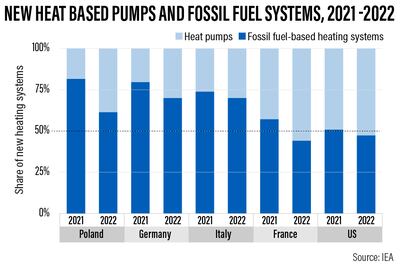Global progress towards energy efficiency accelerated last year, helped by supportive policies and higher investment amid an energy crisis exacerbated by Russia’s invasion of Ukraine, according to the International Energy Agency.
Energy efficiency progress, as measured by improvements in primary energy intensity, rose to 2.2 per cent in 2022, double the average over the previous five years and four times the rate achieved in the past two years, it said in a report on Wednesday.
Europe recorded the largest increase in energy intensity, improving by more than 8 per cent, but this was partly due to a fall in energy demand during a warmer winter, the Paris-based agency said.
“Current efforts to conserve and better manage energy consumption have provided much of the momentum for energy efficiency progress,” it said.
“However, much of this effort is being driven by the need to rein in costs.”
Energy efficiency investment worldwide hit a record of $600 billion in 2022, driven by higher spending on buildings and strong sales of electric vehicles.
But overall growth could slow down this year to about $624 billion, the agency said.
“Investment in the electrification of transport is expected to continue increasing in 2023. However, investment in energy efficient buildings is likely to be constrained by the higher cost of capital,” it said.
Under current policy settings, efficiency-related spending is projected to rise by a further 50 per cent to nearly $910 billion per year by 2030, the agency said.
However, these levels represent only about half of the required investment needed to achieve the agency's Net-Zero Scenario goals of more than $1.8 trillion by the end of the decade, it said.
In its World Energy Outlook report last year, the agency estimated that investment in renewable energy would need to double to more than $4 trillion by 2030 to meet net-zero emissions targets by 2050.
The agency said that policies aimed at boosting energy efficiency had “strengthened” globally.
“Major energy efficiency-related policy announcements from countries covering over 70 per cent of the world’s energy consumption were introduced in 2022 and 2023.”
The US Inflation Reduction Act, which was enacted last year, is expected to provide about $95 billion for energy efficiency measures, the agency said.
The legislation offers a series of tax incentives on wind, solar, hydropower and other renewables, as well as a push towards electric vehicle ownership.
The policy will spur about $3 trillion of investment in renewable energy technology, according to Goldman Sachs.
Last year, the EU launched the REPowerEU plan to help the region diversify its energy supplies amid dwindling Russia natural gas exports.
In March, the EU signed an agreement to cut final energy consumption across the bloc by 11.7 per cent by the end of the decade.

The agency also said that high-efficiency electric heat pumps are key to decarbonising space and process heating.
Global heat pump sales for residential space heating surged by more than 10 per cent in 2022, driven by a nearly 40 per cent increase in Europe, fuelled by subsidies and concerns over gas supply security, the agency said.
In France and the US, the installation of new residential heat pumps overtook those of fossil fuel-based heating systems for the first time, the agency added.








